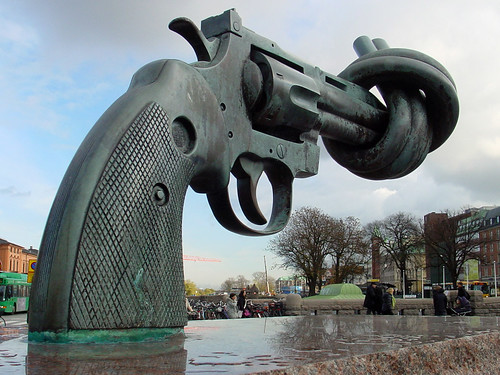This article’s title comes from a Simpson’s chapter, but it's applicable –and oh so well- to basically any subject in which the Big Brother appears. The State, that fictional character that we, the society, needed to create in order to protect us from ourselves, from the social chaos and the anarchy, seems to be having a lot of preponderancy over the citizen’s rights these days.
Last couple of weeks, Wikileaks’ case, and specially, Julian Assange’s bizarre persecution for a felony involving the misuse of a condom (which now, apparently, is called violation in some countries), have taken over all social networks and media.
What is really interesting is that this entire story already happened. A lot of us aren’t old enough to remember –I wasn’t even born-, but in 1971, Daniel Ellsberg gave to The New York Times a group of documents, and they, after verifying their accuracy and authenticity, started publishing them. The USA government filed a petition against them: those documents contained secrets of State, and they asked the Supreme Court to stop and forbid the publication of those documents. But the Supreme Court decided that foreseen censorship was against constitutional rights. The judge couldn’t assure that the revelation of the Pentagon Papers was going to cause a direct, immediate damage to the country or its citizens, and therefore, the government couldn’t stop The NY Times from making public those documents.
However, as Lawrence Lessig affirms, the need for constitutional protection of secrets of State would disappear as soon as those secrets are revealed. Information that has been leaked cannot be hidden anymore: moreover, Internet will exhaustively replicate any information that has become of interest, even if only for the mere curiosity that censorship itself can lift.
What is really worrying governments all over the world is Wikileaks’ credibility. Not even one of those governments involved has denied the veracity of those documents, and the reason is the one that should really be worrying them: Wikileaks has way more credibility than any of them, and it is not only that governments have lost almost all trustworthiness before their citizens, but also that Internet seems to be now just as reliable, if not more, as any traditional media.
Some people is comparing this revelation of secrets of State, with the possible revelation of a person’s private life, trying to make assumptions over its illegitimacy. Quite the opposite, individual rights are not alike the rights of a State for its own preservation, because its mere existence only should depend on its capacity of fulfilling its people’s rights and aspirations. But it doesn’t: actually, the preservation of a State depends on its capacity of keeping information repressed, and it doesn’t have anything to do with the interests of its nationals.
In this same regard, I've heard some people saying that the Internet, as every possible human behavior, is in the need for legal regulation. However, I dissent: Internet already regulated itself, and legislators are late for the party. Netizens, after decades of online activity, have already come to agreement concerning which behavior is acceptable and which is unacceptable, and trying to impose civil laws to the web would be as useless as trying to impose occidental institutions in an ancient tribal society. An indigenous group, for instance, is not unregulated but self-regulated, and so is the Internet, and the misinterpretation between these two ideas is only in the eye of the beholder.
However, discussion seems to be taking a different direction; it is not about the content of what has been “leaked”, but about the alleged violation of secrets of State, that apparently, in the American way of doing things, is above any civil right, not only those concerning freedom of press, speech and information, but also upon human rights and other States’ sovereignty. Apparently, the way of elude responsibility on any event, even if it’s illegal, is declare it Secret of State, of course, if one has the option of doing so.
What we seem to be forgetting is that governments only exist because we, as a collective, transfer (trough the vote) our sovereignty to a higher and fictional entity, which is supposed to answer before us when we hold them accountable. However, in a world where most traditional media is sold to the system, our “right to know” seems to be dissolved, appearing less and less important while they try to convince us that our Father State is going to take our decisions, for us, better than us. They say they don’t have anything to hide, but still they want to rule us without telling us how or why.
A new model of consumption of information, a new paradigm of expression and exchange, this is what is driving governments crazy in all places. Internet, and not internet itself but its users, citizens everywhere, have come to break the pact of silence. Old school politicians who belong in paralyzed structures of power don’t understand the web. They still don’t get how information flows, they have no idea of how to contain the public opinion, and this is just freaking them out. Therefore, what we can’t forget is that the very thing we are trying to preserve is the use of the Internet as a tool for free speech, as a real tool for democratization of media, for public access of information and for government’s accountability all over the world.

